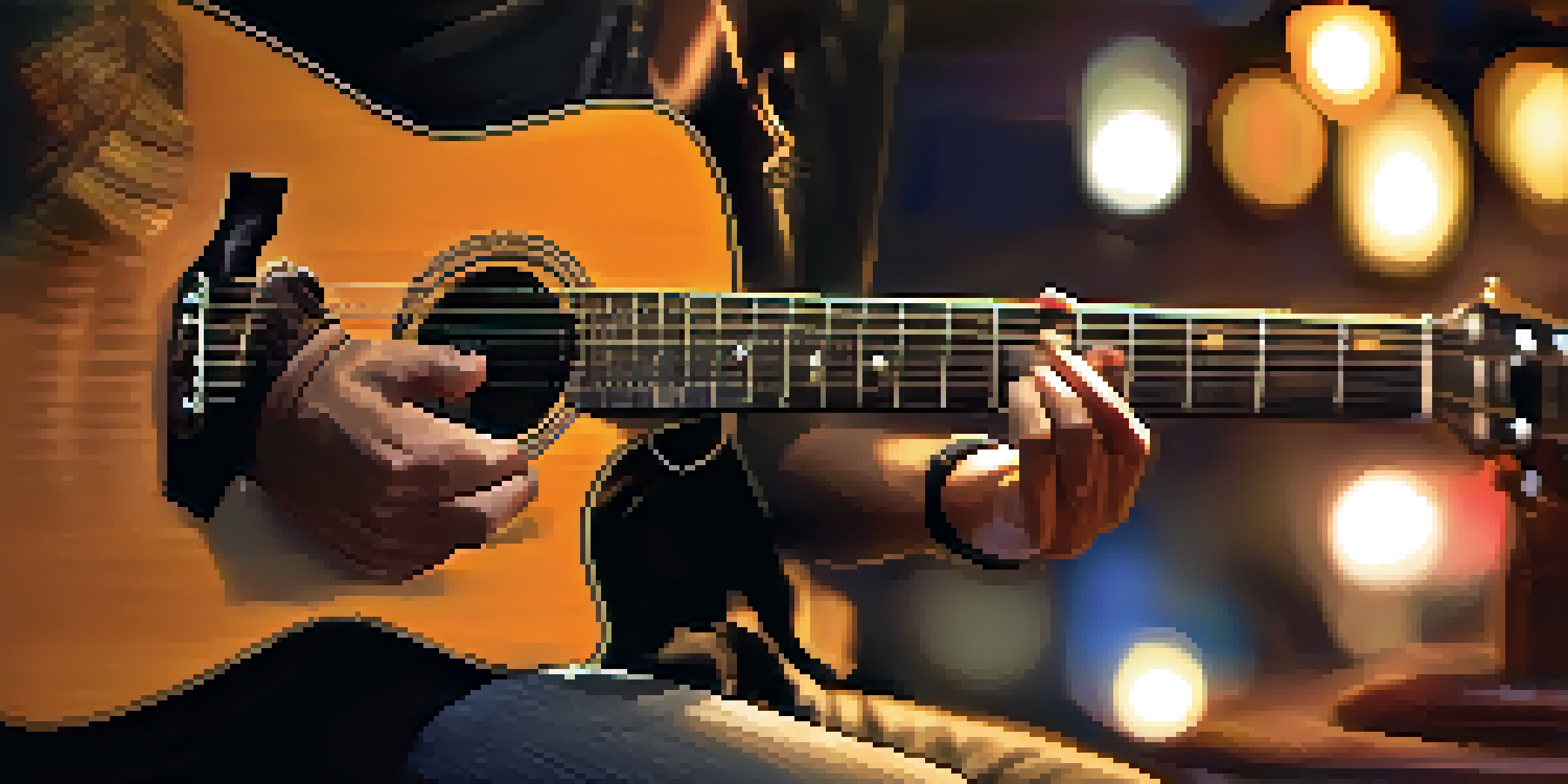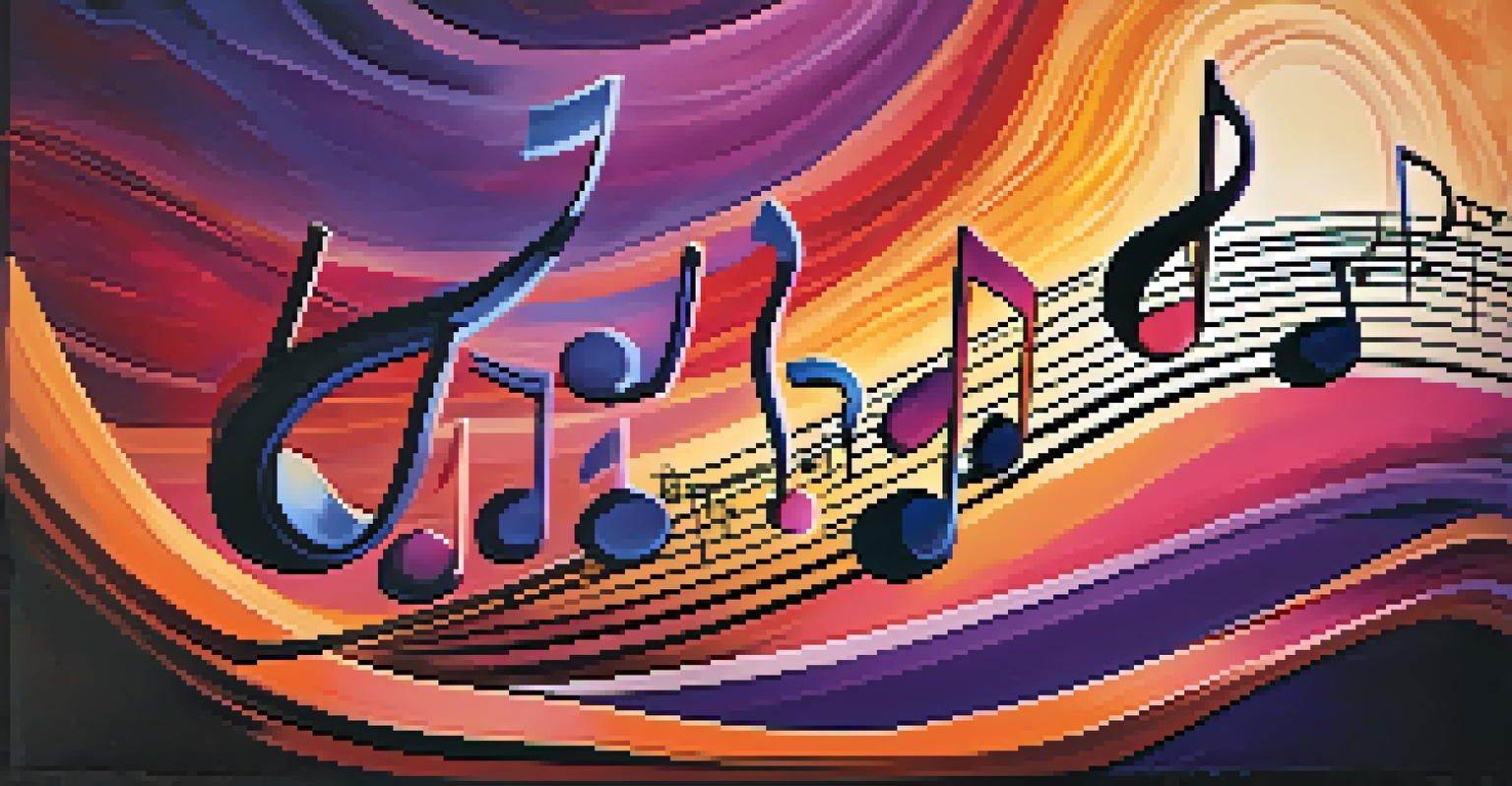Improvisation: A Path to Authentic Personal Expression on Guitar

Understanding Improvisation in Music and Guitar
Improvisation is the art of creating music spontaneously, allowing musicians to express their emotions and ideas in real-time. For guitarists, this means moving beyond written notes and chords to create something unique and personal. Think of it as having a conversation with your instrument, where each note reflects your thoughts and feelings.
Music is the shorthand of emotion.
Many players fear improvisation because it feels unpredictable. However, it's essential to remember that even the most experienced musicians started from a place of uncertainty. Just like learning to speak a new language, improvisation becomes easier with practice and a willingness to experiment.
By embracing improvisation, guitarists open themselves up to a world of creativity. It not only enhances musical skills but also fosters a deeper connection to the music, leading to a more fulfilling playing experience.
The Emotional Connection in Improvisation
One of the most powerful aspects of improvisation is its ability to convey emotion. When you improvise, you tap into your feelings, allowing them to guide your musical choices. This can create a profound connection between the musician and the audience, as listeners can sense the authenticity behind the notes.

Imagine a time when you felt an overwhelming emotion—joy, sadness, or nostalgia. Translating those feelings into music through improvisation can be incredibly cathartic. Each note becomes a reflection of your inner world, making your performance resonate more deeply.
Improvisation Enhances Creativity
Embracing improvisation allows guitarists to express their emotions and develop a unique musical voice.
Ultimately, this emotional connection is what makes music so impactful. By embracing improvisation, guitarists can share their stories and experiences in a way that structured compositions sometimes cannot.
Building Confidence through Improvisation
Improvisation can be intimidating, especially for beginners. However, it's also an excellent way to build confidence as a guitarist. The more you practice improvising, the more comfortable you'll become with your instrument and your own musical voice.
Improvisation is the ability to create something out of nothing.
Consider starting with simple exercises, like jamming along with a backing track or experimenting with scales. Over time, you’ll find that those initial feelings of fear give way to excitement and creativity. Each successful improvisation will boost your confidence and encourage you to explore further.
As you gain confidence, you'll notice that your improvisational skills also translate into other areas of your playing. You'll become more adept at learning songs, understanding music theory, and even collaborating with other musicians.
Finding Your Personal Style through Improvisation
Every guitarist has a unique voice, and improvisation is a powerful tool for discovering and developing that voice. As you experiment with different techniques and musical ideas, you're essentially crafting your own style. This journey of exploration can lead to a deeper understanding of what makes your playing distinct.
Listening to various genres and styles can inspire your improvisation. For instance, incorporating elements from jazz, blues, or rock can add richness to your playing. As you blend these influences, you’ll create a sound that is truly your own.
Build Confidence through Practice
Regular practice of improvisation helps guitarists become more comfortable with their instrument and musical expression.
Remember, finding your style is a process. Embrace the journey of improvisation as a way to express your individuality, and don’t be afraid to take risks along the way.
The Role of Practice in Improvisation
Like any skill, improvisation requires practice to develop. Setting aside dedicated time to work on improvisational techniques can significantly enhance your abilities. This practice can involve everything from exploring scales and chords to experimenting with different rhythms and melodies.
One effective method is to practice improvising over a chord progression. This allows you to focus on expressing yourself while still being grounded in a harmonic context. Over time, you’ll develop a sense of flow and intuition that makes improvisation feel more natural.
Additionally, recording your improvisations can provide valuable feedback. Listening back allows you to identify areas for improvement and recognize your growth as a musician.
Improvisation as a Tool for Collaboration
Improvisation is not just a solo pursuit; it can also be a fantastic tool for collaboration with other musicians. When you improvise with others, you create a dynamic exchange of ideas and emotions, enriching the musical experience for everyone involved. This collaboration can lead to unexpected and beautiful moments in music.
Consider joining a jam session or finding a group of fellow musicians to explore improvisation together. These collaborative environments foster creativity and allow you to learn from one another, helping you grow as a guitarist and a musician.
Collaboration Enriches Music
Improvising with other musicians fosters a dynamic exchange of ideas, enhancing the overall musical experience.
Moreover, playing with others can push you out of your comfort zone. You'll be encouraged to take risks, try new ideas, and adapt to the styles of your fellow musicians, all of which enhance your improvisational skills.
The Joy of Improvisation: Playing for Fun
At its core, music is meant to be enjoyed, and improvisation embodies this spirit of playfulness. When you let go of perfectionism and allow yourself to have fun with your guitar, you open the door to endless musical possibilities. This joy can be incredibly liberating and revitalizing for any musician.
Think of improvisation as a playground for your musical ideas. Just as children explore and discover through play, you can approach guitar improvisation with a sense of curiosity and adventure. This mindset can lead to surprising breakthroughs and creative expressions you never thought possible.

Ultimately, the joy of improvisation lies in its freedom. It invites you to be spontaneous, express yourself authentically, and, most importantly, have fun with your music.